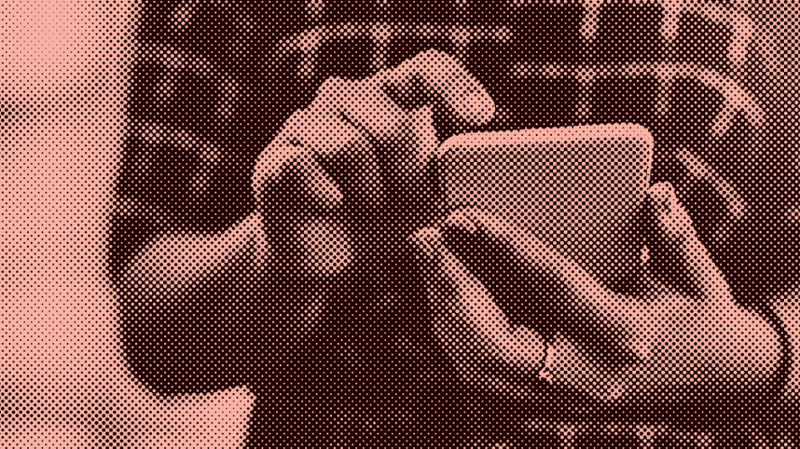
By Alix Hackett
For adults with serious mental health disorders such as schizophrenia, bipolar disorder or major depression, employment can provide much more than a paycheck. Holding down a job, even a part-time one, can improve self-esteem, meet requirements for federal benefits and ease the road to recovery.
Despite those benefits, and the fact that an overwhelming majority of individuals with serious mental illness want to work, unemployment among this population is staggeringly high — nearly 80%, according to some studies.
It’s a conundrum that has occupied Joanne Nicholson, professor of the practice in the Institute for Behavioral Health, for decades: How do we open the door to success for those who need it most? “I’m committed to helping people with mental health conditions do the best they can to achieve the goals they set,” Nicholson says. “Employment is a huge piece of that.”
Greater impact
In 2015, Nicholson began working on a new kind of project, one informed by research but with the goal of creating a tool that could help people with mental illness succeed in the workplace. For a clinical and research psychologist accustomed to academia, it was uncharted territory.
“As an academic researcher, you get your grant, you do your research and you write a paper, and that’s all good,” Nicholson says, “but I got to the point in my career where I wanted the work to have a greater impact. People with serious mental illness are not necessarily sitting home reading journal articles. I wanted it to make a difference.”
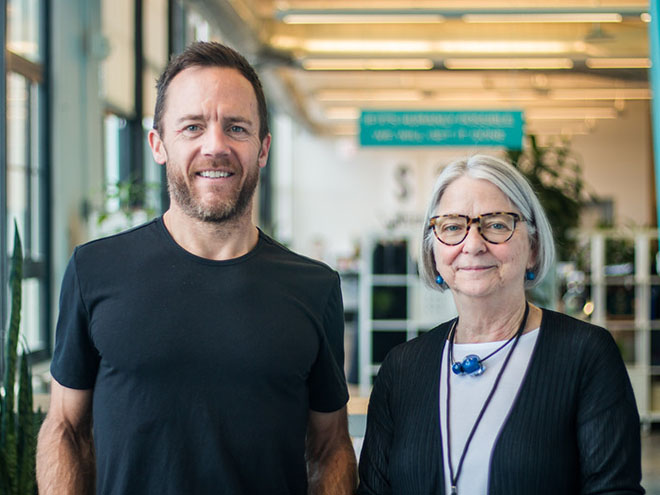
In the last five years, Nicholson’s project became WorkingWell, a digital platform of mobile tools that people with behavioral health conditions can use on the job to help them cope with challenges and develop successful routines. She collaborates with Chris Burns of Fort Point Design, an expert in designing accessible digital tools and resources for individuals with behavioral health challenges and cognitive impairments, and neurodiverse individuals. WorkingWell is accessible through a mobile app or on a computer or tablet, and is customizable for users with a wide range of abilities.
Studies show the most effective strategies for people with mental illness are those that provide in-person support — whether through an employment specialist or a case manager — to help the employee overcome difficulties as they arise. Those models are expensive and unfortunately uncommon, but Nicholson envisions WorkingWell as a kind of digital support system that can achieve similar results while being widely accessible.
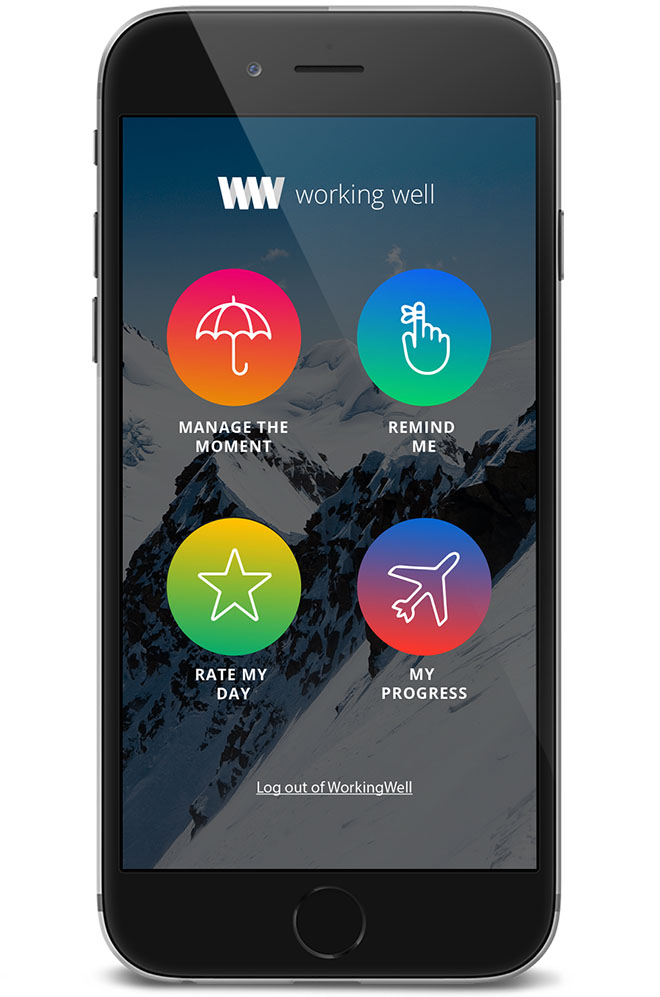
With a few taps or clicks on the WorkingWell app, employees with mental illness can set goals for their workweek (“Have positive conversations with co-workers,” “Complete tasks on time”), schedule recurring reminders (“Take meds,” “Check in with supervisor”), and quickly reference the steps required to complete a task. Throughout the day, if they’re feeling overwhelmed or angry, clicking the “Manage the Moment” button reminds them to use strategies that have worked for them in the past, like deep breathing or taking a quick break.
Each evening, users are prompted to “rate” their day as well as any progress they made toward their goals, and the coping strategies they used. In doing so, Nicholson hopes they will begin to recognize the patterns of behavior that help them succeed.
“People often get caught up in the day to day, and this encourages them to take a moment to reflect,” she explains. “You want them to realize, ‘Oh, I went to bed last night at 10 o’clock and look, the next day I had a better day.’”
Support from all sides
Every aspect of the WorkingWell app — from the language used to the five-star rating system — is informed by hundreds of hours of research, focus group sessions and user testing. With federal funding from the National Institute on Disability, Independent Living and Rehabilitation Research, Nicholson’s team developed a prototype reflecting input from more than 350 stakeholders.
“It’s very much based on user experience design,” says Nicholson. “We consulted people with mental health conditions, providers who work with them, people who train employment specialists, and national and local experts.”
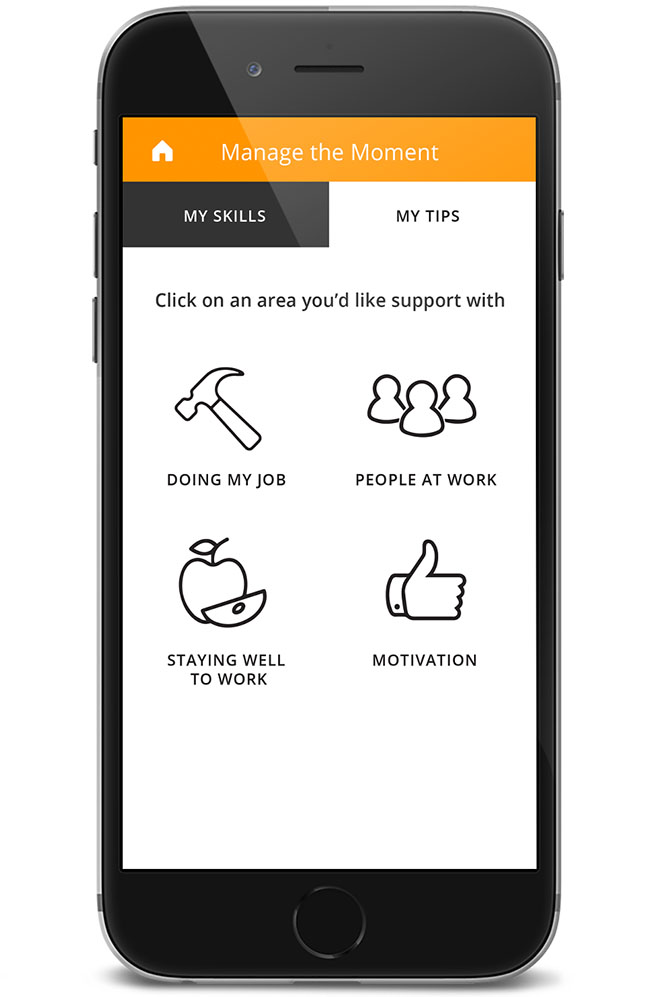
Last year, with support from Brandeis Innovation, Nicholson’s team applied for and was selected as a finalist in the MassChallenge HealthTech initiative — a highly selective international startup accelerator — which led to a working partnership with the Massachusetts Department of Developmental Services (DDS). The project received additional funding and mentorship through the Brandeis SPROUT program, which helps students, faculty and staff bring their research and entrepreneurial ideas to life. To cap it off, this year Nicholson was named a fellow by the Brandeis I-Corps program, which receives funding from the National Science Foundation to accelerate the economic and societal benefits of research.
This wealth of connections and support has been a game changer for Nicholson and her team, who, in addition to funding, needed help identifying a business model that could sustain the platform moving forward.
“I’m a psychologist by training, and so the whole accelerator entrepreneurial world is completely foreign to me,” Nicholson acknowledges. “Having mentors of this caliber has been incredible.”
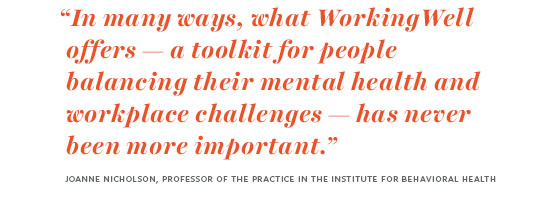
What’s next
At the request of their partners at DDS, Nicholson, Burns and the WorkingWell team are now hard at work creating a second prototype for employees with autism spectrum disorder, a disability that affects an estimated 1 to 2% of the American population. They’re also working on their sales pitch, to great success: The team received the “best pitch” award at an April 2020 Massachusetts Innovation Nights event, and was invited to participate in the New England Innovation Awards competition this fall.
In March, the COVID-19 pandemic forced WorkingWell researchers to temporarily pause meetings with DDS and other partners. When work resumed, it was with renewed urgency, as state agencies acknowledged the increasing need for mental health resources that can be delivered virtually.
“DDS strives to make the services we provide as accessible and flexible as possible for our diverse consumer base,” says Christopher Klaskin, an ombudsman and legislative director at DDS. “Partnering with WorkingWell has expanded that agenda. We are thrilled by their progress and look forward to our continued work on this innovative project.”
In many ways, what WorkingWell offers — a toolkit for people balancing their mental health and workplace challenges — has never been more important, says Nicholson.
“That intersection of mental health and well-being and family life and work: We’re all sitting in the middle of it now, there’s no boundary,” she points out. “What better time to be thinking about innovation at the interface of those?”
